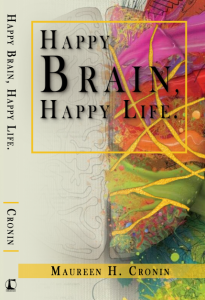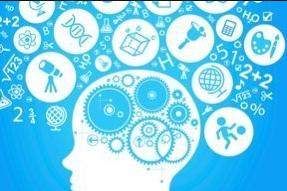 There is a reason that you have been told since you were a child to look at the “bright side”. Being positive-minded affects your brain, your heart, and your health. One of the best psychology journals, Psychology Today wrote about their findings about positivity in 2011. The article was actually entitled Happy Brain, Happy Life which is the name of my book! (And no…I had not seen this article until recently.)
There is a reason that you have been told since you were a child to look at the “bright side”. Being positive-minded affects your brain, your heart, and your health. One of the best psychology journals, Psychology Today wrote about their findings about positivity in 2011. The article was actually entitled Happy Brain, Happy Life which is the name of my book! (And no…I had not seen this article until recently.)
One of the findings is that “happy” brains are more creative, quicker, and more mentally alert. And scientifically speaking, being happy can increase your overall health in many ways.
Being Happy:
- Stimulates nerve connections growth
- Increases attentiveness, which improves cognition and increasing mental productivity
- Improves the ability to analyze and think
- Affects the view of one’s surroundings
- Leads to more happy thoughts
Happy people are not only more creative, but they tend to solve problems with greater facility than non-happy brains.
 Behavioral scientists have tracked the effects on a person’s life between someone with a “happy brain” and someone with a “not happy” brain person. There are also many additional benefits that are not just about attitude and outlooks.
Behavioral scientists have tracked the effects on a person’s life between someone with a “happy brain” and someone with a “not happy” brain person. There are also many additional benefits that are not just about attitude and outlooks.
The non-happy brain can produce health issues ranging from mild to severe. Prolonged negativity and not being happy can also adversely effects mental health and they are more likely to use drugs or alcohol to cope. Let’s look at some of the basic differences each mindset has on a person:
| HAPPY BRAIN PEOPLE | NON-HAPPY BRAIN PEOPLE |
| Lead happy, rich, fulfilled lives | Frequent headaches |
| Spend the least amount of time alone, and the most time socializing | Chest pains |
| Have good relationships | Fatigue |
| Have better health habits | Upset stomach |
| Have stronger immune systems | Problems sleeping |
| Live longer than non-happy brain counterparts | Anxiety, depression, and drastic fluctuations in metabolism |
If you want to be happy in your life, really deep-down happy like I talk about in my book, Happy Brain, Happy Life, we need to balance out our brains with positive imagery and thoughts. We are programmed to see the negative in things, so our job is to help our brains by training them to see the positive perspective of situations.
Being happy is not just a phrase, and it means a whole lot more to your brain than you might think. In fact, experiencing pleasure actually results in reinforcing pleasure. It is an inner reward system to show you the path to happiness, which encourages your brain, and most importantly you, to fine tune happiness as a way of life.
 Further studies prove that negative moods really disturb your interaction with your environment, and this adversely affects your ability to perceive, remember, and reinforce existing or create new neural connections. Conversely, being happy improves your ability to be more cognitively alert and productive.
Further studies prove that negative moods really disturb your interaction with your environment, and this adversely affects your ability to perceive, remember, and reinforce existing or create new neural connections. Conversely, being happy improves your ability to be more cognitively alert and productive.
The effects of worrying about a specific task and the performance are also very telling. In another study by Clinical Psychology, subjects were required to organize things into two categories. People who reported that they worry 50% of the time or more showed a significant disruption in their ability to sort objects, as the difficulty of the sorting task was increased. Researchers found they were able to quantify that the disruption was a result of increased levels of negative thoughts.
If the researchers are correct, negative thinking doesn’t help solve anything, and actually makes it harder for you to think of a helpful solution. Think about what happens when you lose something. You are so focused on finding it your anxiety levels increase, which in effect, strangles the brain from finding said item. Yet, a few hours later, or the next day, you remember exactly where it is. Why is that? Because you have stopped stressing your brain, so it was able to relax and access the memory.
 Physically, your brain releases chemicals with every thought. Every thought… Therefore, your thoughts and mental capacities will directly affect how fast you develop and grow physically and spiritually with these “thought chemicals”. Your inner thoughts will always be reflected in your outer circumstances. Why? Because nothing changes until we first change the way we think about it.
Physically, your brain releases chemicals with every thought. Every thought… Therefore, your thoughts and mental capacities will directly affect how fast you develop and grow physically and spiritually with these “thought chemicals”. Your inner thoughts will always be reflected in your outer circumstances. Why? Because nothing changes until we first change the way we think about it.
Thinking positive, happy, hopeful, optimistic and joyful thoughts decrease cortisol levels (produced from stress) and increase serotonin. Serotonin creates a sense of well-being which helps enable your brain to its peak capacity. Generally speaking, happy thoughts and positive thinking, support brain growth, as well as new synapse generation and reinforcement in the prefrontal cortex (PFC) section. This is the integration center of all brain-mind functions. The PFC can control your emotions and behaviors and help you focus on your goals and ideas.
One more note here: neuroscientists have discovered people with a more cheerful disposition have higher activity occurring in their left PFC. Okay, enough brain talk.
 Optimists and happy brain people don’t just lead and live better, more fulfilled lives and they have a very small chance of suffering from clinical depression. When people reduce high levels of stress it helps to support the immune system and they are not as vulnerable to disease.
Optimists and happy brain people don’t just lead and live better, more fulfilled lives and they have a very small chance of suffering from clinical depression. When people reduce high levels of stress it helps to support the immune system and they are not as vulnerable to disease.
You can now see how important it is to actually feel and be happy. It is crucial to prioritize happiness and make this one of your top missions. Seek out massage therapists, energy healers, Reiki Masters, or any healer that you resonate with to help you create more positive thoughts. Because being happier means being healthier.
For more by Maureen H. Cronin, visit https://www.mhcronin.com/
Sources:
Psychology Today, 2011
Clinical Psychology study, 2015
